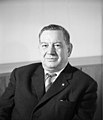1972 Besmenian federal election: Difference between revisions
Neuleinster (talk | contribs) |
Neuleinster (talk | contribs) No edit summary |
||
| Line 227: | Line 227: | ||
<!-- map --> | <!-- map --> | ||
| map_image = | | map_image = Besmenia1972electionmap.png | ||
| map_size = | | map_size = 200px | ||
| map_alt = | | map_alt = | ||
| map = | | map = | ||
| map_caption = | | map_caption = Strongest party by state | ||
<!-- bottom --> | <!-- bottom --> | ||
| title = | | title = [[Prime Minister of Besmenia|Prime Minister]] | ||
| before_election = | | before_election = [[Johannes Schmidt]] | ||
| before_party = | | before_party = [[Social Democratic Union (Besmenia)|SDU]] | ||
| posttitle = | | posttitle = | ||
| after_election = | | after_election = [[Robert Gleitzmann]] | ||
| after_party = | | after_party = [[Besmenian People's Party]] | ||
}} | }} | ||
The '''1972 Besmenian federal election''' took place in [[Besmenia]] on January 16, 1972. It was the election of the 14th [[Federal Chamber (Besmenia)|Federal Chamber]]. | The '''1972 Besmenian federal election''' took place in [[Besmenia]] on January 16, 1972. It was the election of the 14th [[Federal Chamber (Besmenia)|Federal Chamber]]. | ||
Revision as of 07:41, 14 October 2023
| |||||||||||||||||||||||||||||||||||||||||||||||||||||
427 seats 214 seats needed for a majority | |||||||||||||||||||||||||||||||||||||||||||||||||||||
|---|---|---|---|---|---|---|---|---|---|---|---|---|---|---|---|---|---|---|---|---|---|---|---|---|---|---|---|---|---|---|---|---|---|---|---|---|---|---|---|---|---|---|---|---|---|---|---|---|---|---|---|---|---|
| |||||||||||||||||||||||||||||||||||||||||||||||||||||
File:Besmenia1972electionmap.png Strongest party by state | |||||||||||||||||||||||||||||||||||||||||||||||||||||
| |||||||||||||||||||||||||||||||||||||||||||||||||||||
The 1972 Besmenian federal election took place in Besmenia on January 16, 1972. It was the election of the 14th Federal Chamber.
The SDU under Prime Minister Johannes Schmidt lost a lot of votes and after 8 years as the strongest party became the second strongest again. The strongest party was the BVP, which sent its chairman Robert Gleitzmann into the race as the top candidate and benefited from the losses of the SDU. The FBBP and the BRP gained mandates. The DB lost votes and dropped out of the Federal Chamber with 3.3%.
Background
Electoral system
Contesting parties
Prime Minister candidate of the parties
BVP
SDU
FBBP
BRP
BELP
DB
Campaign
TV debates
Results
Government formation
| Coalitions considered | Seats |
|---|---|
| Total seats | 427 |
| Absolute majority (From 214 seats) | |
| BVP, SDU | 279 |
| BVP, FBBP | 258 |
| BVP, BRP, BELP | 252 |
| BVP, BRP | 227 |
The coalition negotiations between the BVP and the SDU to extend the government cooperation that had existed since 1956 failed because Schmidt refused to work with Gleitzmann. As a result, the BVP began negotiations with the BRP. On February 24, 1972, the federal government Gleitzmann I, the first blue-orange government, was formed. The participation of the BRP in government triggered strong protests in parts of the Besmenian population and at the diplomatic level.






